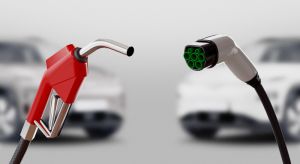Considering the cost, it’s no surprise that people are looking to future-proof their investment, whether it’s through upgrading or downsizing to match life stages, opting for a longer manufacturer’s warranty or even turning to electric vehicles to get ahead of the curve (as well as doing their bit for the environment). But when it comes to buying an electric car, what are the costs involved, and how much money do you save in comparison to buying a petrol car, if any? Find out with this Canstar Blue guide.
On this page:
Electric Cars Vs. Petrol Cars

Electric cars have been gaining traction both globally and in Australia over the last few years, with more brands trying their hand at manufacturing, and more technology being developed to support the next step in vehicular evolution. But in a head-to-head comparison, how do electric vehicles stack up against the traditional petrol vehicle, and what should drivers be aware of?
We’ll discuss the costs and potential savings of a number of key areas, including:
- Initial purchasing costs
- Running costs
- Maintenance and servicing costs
Electric Car Vs. Petrol Car Purchasing Costs Compared
Buying a brand-new car will always be a big expense, with even the cheapest of the cheap costing you tens of thousands of dollars. But what’s the price difference between buying a new petrol car and a new electric car?
- Petrol: A brand-new petrol car can be picked up for under $19,000, with small cars such as the Mitsubishi Mirage, Suzuki Baleno, MG 3 and Kia Picanto all available from around this price.
- Electric: Electric cars on the other hand, cost between $40,000 and $50,000 at a minimum, with the MG ZS EV and Hyundai Ioniq currently the cheapest available at the time of writing.
While incentives are available to those looking to buy electric in certain states and territories – and base-level electric cars generally come with more features than base-level petrol cars – the initial price is a big barrier for many looking to buy a new car. Add in the cost for installing a charging station in your home, and it can be a big hit to your finances. However, as more brands are looking to enter the EV market, and the technology becomes more affordable, it’ll likely drive electric car prices down in the future.
Shopping for tyres? Check out JAX Tyres & Auto
Electric Car Vs. Petrol Car Running Costs Compared

One of the biggest advantages of an electric car is the running cost, with electricity (generally) cheaper than petrol. But how much does it actually cost to run a petrol and electric car?
The Electric Vehicle Council estimates that the average Australian drives 15,000km and spends around $2,160 on petrol per year, which works out to be $0.14/km. Electric vehicles travelling 15,000km would cost around $600 per year in electricity costs to charge, which works out to be $0.04/km. That’s a difference of around $1,500 per year.
However, how much money you may save on running costs will vary, as a number of factors – such as how much you actually drive, the petrol type, as well as your electricity provider and the time of day you’re charging your car – but for the most part, electric vehicles are cheaper to run than petrol cars, and you won’t have to deal with the price volatility at the petrol bowser either. And if you have a solar system installed, you may be able to charge your EV with little to no added cost to your energy bill.
Some energy providers also offer speciality deals to EV drivers to help offset any additional electricity costs that may come with charging their vehicle at home. This is usually done through discounted rates or credits on your bill. Below, you’ll find pricing information for AGL’s Electric Vehicle plan available in New South Wales, Victoria, Queensland and South Australia.
AGL Electric Vehicle Plan
Here is AGL’s Electric Vehicle Plan on our database that includes a link to the retailer’s website for further details. This is a product from a referral partner†. These costs are based on the Citipower network in Melbourne but prices may vary depending on your circumstances. This comparison assumes general energy usage of 4000kWh/year for a residential customer on a single rate tariff. Please use our comparison tool for a specific comparison in your area. Our database may not cover all deals in your area. As always, check all details of any plan directly with the retailer before making a purchase decision.
Electric Car Vs. Petrol Car Maintenance & Servicing Costs Compared

Maintenance and getting your car regularly serviced can be a costly endeavour, but a necessary one if you want to keep your new pride and joy running smoothly. Servicing costs will vary depending on whether it is a minor or major service. Most new cars will also have some form of new car servicing arrangement with the dealership. For the most part though, electric cars are generally cheaper to service as they have fewer moving parts, with no need for spark plugs, valves or pumps to be inspected and replaced, and no need for oil changes either.
- Check out our guide on electric vehicle servicing for a further breakdown of what to expect when looking under the hood.
How much money do you save with an electric car?
We all want to get the best deal possible when it comes to buying a new car, whether that’s a discount on the price tag or cheaper servicing if you take it back to the dealership. But if you opt for an electric car over a new petrol model, how much are you actually saving?
The money saving element of an electric vehicle comes in over the long-term, with lower running and maintenance costs compared to petrol engines. But with higher upfront costs, you may not be back in the black for a while, and even then, it depends on a variety of factors, such as how much you purchased your car for, how much you drive, and the state of the fuel and electricity industries as time progresses, meaning it’s not so cut and dry. But like any newer technology, investing early may have some big payoffs down the line.
- Canstar has put together a guide on how much electric cars actually cost to help you keep on top of the key areas.
You may also be interested in:
- What’s the best oil for your engine?
- What petrol should you use?
- Cheapest Car Tyres in Australia
- Average Car Cost in Australia
- What country does my car come from?
Are electric cars worth buying in Australia?

It’s easy to be swindled by the latest model to hit the car market, with the sleek design, flashy interior and fancy features enough to get even the most frugal drivers reaching for their wallet. But when it comes to forking out for a new car, are electric cars worth buying?
The short answer is: maybe. Ultimately, buying a new car is entirely dependent on what you need a new car for. If you’re looking for something to help you get your groceries once a week, then it may not be worth setting your sights on an electric car, but if you’re looking to upgrade, or find yourself driving regularly and aren’t afraid of investing a bit more money upfront, then an electric vehicle may be worth exploring.
One of the main selling points is that the EV market is still in its infancy in Australia, meaning there’s plenty of upside as the technology improves, the supporting infrastructure becomes more commonplace, and more brands enter the market to drive down the prices through competition. If you’re still not sure about electric vehicles, check out guide on the pros and cons of electric vehicles to see what else you should consider when looking to buy.
Picture credit: Smile Fight/shutterstock.com, Bordovski Yauheni/shutterstock.com, ALDECA studio/shutterstock.com, 4 PM production/shutterstock.com, Platoo Fotography/shutterstock.com


Share this article